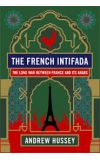
16 Mar 2014 21:19:57
Back in central Paris, under cafe awnings far from the périphérique, the road that divides the white bourgeois capital city from its new citizens, I asked many French intellos why such a film shouldn't be made. They proved unwilling to discuss the subject. I was half-French, I knew the culture, and should be aware why it couldn't be done. "It's so complicated," a friend said, passing to the more pleasant subject of where to have dinner.
Andrew Hussey teaches at the University of London Institute in Paris, and he has spent years tracking the horrifyingly dysfunctional relationship between secular republican France and its Arab citizens He's as much at home with hip-hop and gruesome Islamist videos as he is talking to buttoned-up French prison officials. Hussey thinks that the French press, metropolitan and fashion-driven, doesn't want to know how bad things are. He believes that the hatred and fear can be explained only by the long and appalling history of French empire, and in this respect he is correct. I admire Andrew Hussey's book because he has had the courage to go where I didn't. And yet I cannot wholly buy into the sense of futility that pervades it. True, the story of the French and their Arabs is a gruesome one, but maybe things are not quite as hopeless as he thinks.
The French obsession with North Africa began with Napoleon's looting of Egypt, gathering momentum with the 1830 invasion of Algeria. Here was a cheap back-door empire with which to confront imperial Anglo-Saxon neighbours, and, for the aesthetes, paysages where they could enjoy cheap Arab boys and smoking hashish. Settlers swarmed in, creating a belligerent white African culture in which Arabs and Jews were despised as much as visiting French officials who believed in the quaint notion of France's "civilising mission". Within a generation Algeria had legally become part of France.
However, the rights enjoyed by European immigrants were never handed on to Arabs. In the late 1950s, Algeria exploded, and after a long, bloody war, in which torture was freely used, and horrifying reprisals became commonplace on both sides, the French colons were forced to leave under the most humiliating circumstances. Their forced return coincided with the arrival in France of a large North African migrant workforce, who were housed first in shacks, then segregated within newly constructed tower blocks. Desperate banlieue kids adopted English football clubs ("French football is shit," one of them tells Hussey), hip-hop argot, and, when this got them nowhere, fell prey to violent antisemitism and an admiration for Osama bin Laden. As one might expect, that got them into the hands of the police, who infiltrate these gangs. At least 70% of the inmates of French jails are said to be North Africans.
Hussey is good on the details of this "intifada", but he doesn't tell us what can be done. In particular, he fails to examine how French republicanism, while part of the problem, is also a solution to the growth of Islamism. Throughout French public life, it is an axiom, barely contested, that to be French you must accept the rules of laïcisme. There is no equivalent for this word in English, nor, from the perspective of our own messy scene, glued together by tribal or class loyalties, is the concept easily explicable. French republicanism dictates that being French rules out other loyalties, and thus other competing identities. No one in France can be identified as part of an ethnic group or as a follower of a religion.
Hardline secularism hasn't been a total failure. No, France isn't as violent as one might think (revolutions have been televised in France, but France is a surprisingly stable country when you consider the French past). Not all Arab immigrants, surely, meet with rejection, and not every Muslim life is characterised by rage or emptiness. There is a large Arab middle class in France, and Muslim practices are freely accepted outside the paranoid ranks of the Front National. In return for equality, not veiling up in government buildings may seem a price worth paying. Meanwhile intermarriage, ignored by Hussey, has caused Frenchness no longer to seem the exclusive property of white France.
These changes may not appear spectacular, but they are real and lasting. And France, against the odds, has become a less arrogant, exclusive place. One may track changing French attitudes through the revived fortunes of Albert Camus. Born in Algeria, getting out of poverty thanks to the secular elitism of the French educational system, Camus spoke out against torture, and wanted to see a multiracial Algeria in which power was shared. His views were reviled by the Left Bank gurus, not least his former friend Jean-Paul Sartre. But Camus's pragmatic tolerance is now official French doctrine, and his work is admired by young Arab French intellectuals. "In Algeria as elsewhere," Camus wrote, "terrorism can be explained by the absence of hope." France does not require an exorcist in relation to its past, as Hussey suggests. It just needs to find grounds for more hope. And the same can be said about other societies, such as ours, faced with Islamist violence.

